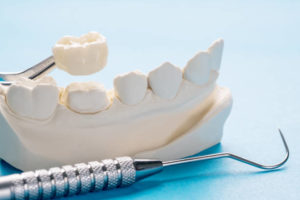 A dental crown is the most commonly used restorative procedure because of the restoration’s versatility. Whether to repair a damaged tooth or hold a bridge in place, a crown is meant to provide a long-term solution. Various factors affect the lifespan of dental crowns, like the materials used, the location of the restoration, and your aftercare routine. Here’s how long you can expect your crown to last before needing a replacement.
A dental crown is the most commonly used restorative procedure because of the restoration’s versatility. Whether to repair a damaged tooth or hold a bridge in place, a crown is meant to provide a long-term solution. Various factors affect the lifespan of dental crowns, like the materials used, the location of the restoration, and your aftercare routine. Here’s how long you can expect your crown to last before needing a replacement.
Life Expectancy of Dental Crowns
A crown is a custom-made cap that’s bonded over the surface of a tooth above the gum line. It can protect a weakened tooth from breaking or repair significant damage, like a fracture. However, a crown can be used along with other procedures, like after a root canal or to support a bridge.
No matter the reason, the average life expectancy of a crown ranges from 5 to 15 years. Many things affect the lifespan of a restoration, like:
- Materials: Crowns can be made from metals, gold, ceramic, zirconia, and other materials. Metal restorations can last for slightly longer than porcelain or ceramic.
- Location: Back teeth experience more pressure from grinding and chewing food. Crowns placed on molars may need to be replaced sooner than those on the front teeth.
- Oral Hygiene: Good oral hygiene protects your crown from failure. Brush, floss, and use a daily mouthwash.
- Dental Care: Besides caring for your smile at home, a cleaning and checkup every 6 months will protect your restoration. Your dentist will check your crown at each appointment to ensure there aren’t any concerns.
- Oral Habits: Chewing on inedible objects or using your teeth in place of scissors and other tools can cause you to need a replacement sooner.
- Diet: Hard or sticky foods can damage your crown. It’s best to have them in moderation and limit your intake of sugary foods and drinks to keep cavities at bay.
- Lifestyle Habits: Smoking or drinking alcohol often can lead to dental crown failure.
- Teeth Grinding: Untreated bruxism can damage a crown, but a nightguard can protect your natural teeth and the restoration.
Signs of Dental Crown Failure
No matter how well you care for your crown, it will need to be replaced, eventually. Common signs of dental crown failure include:
- Visible damage to the crown, like breaks or cracks.
- Pain involving the tooth underneath the crown.
- The crown feels loose or unstable.
- The crown falls off.
- The crown is aesthetically unpleasing.
Don’t wait to have your crown replaced, or a small issue can turn into a big problem. Your dentist will create a new restoration from high-quality materials to ensure your tooth has the protection it needs to last for a lifetime.
About Dr. Amanda Hyland
Dr. Hyland earned her dental degree at the University of Iowa College of Dentistry and has regularly continued her education in the most advanced treatments, techniques, and technologies. As a member of many professional organizations, including the Academy of General Dentistry, she has the qualifications and a reputation you can trust. Request an appointment through our website or call (507) 223-3496.

